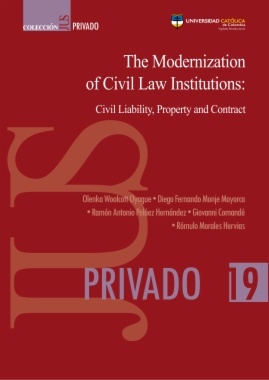Civil liability, the transfer of property rights, and contractual modernization have been difficult issues for legal treatment due to their permanent jurisprudential evolution and the variety of doctrinal studies that seek to establish their develop- ment and modern interpretation.The dynamics of civil liability requires a permanent adaptation to constant social changes, advances in science and technology, due to which this issue has an important impact inside and outside of private law.¡ Based on the previous premises, this research book aims to present the most transcendent difficulties of the general theory of the law of damages, by studying risk at the jurisprudential level, the method to transfer property in the field of international trade, as well as the notion of civil liability in Europe and Latin America, which contributes to a broader view on the determination and preven- tion of damage. Undoubtedly, the result is a dogmatically enriching and useful text, both for students and law practitioners, who usually face problems that need to be analyzed in a modern way, in light of the fundamentals of civil liability.
- Cover
- Title page
- Copyright page
- Contenido
- Introduction
- Chapter 1. Toward a Reconstruction of Strict Liability Law through Colombian Jurisprudence
- Preliminary considerations
- The legislative formula of article 2356 of the Colombian Civil Code and its jurisprudential interpretation
- Characterization of hazardous activities and its effects for the attribution of liability in the jurisprudential interpretation of article 2356 of the Colombian Civil Code
- Strict liability for risk through an examination of Colombian jurisprudence
- Hazardous activities and strict liability for injury: the potential for injury
- Hazardous activities and the use of presumptions in Colombian jurisprudence
- Final considerations
- Chapter 2. Presumptions in the Context of Civil Responsibility and their Application in Colombian Jurisprudence
- Preliminary considerations
- Civil liability derived from dangerous activities in Colombia
- Foundation and definition
- Evolution of liability derived from dangerous activities in Colombia
- Presumptions and their treatment in the Colombian legal system
- Legal nature
- Classification of presumptions
- Presumptions in the context of civil liability
- The presumption of liability
- The presumption of fault
- Strict liability
- Evidentiary activity in the context of liability for dangerous activities
- Effects of the presumption of article 2356 of the Civil Code
- Alternatives to proving liability for hazardous activities in the General Procedure Code
- Final considerations
- Chapter 3. The method to transfer ownership of merchandise in international trade
- Preface and panorama
- The international trend
- Closing reflections
- Chapter 4. European law of civil liability
- The paradigms of European law of civil liability
- The Italian evolution of fault-based and faultless liability in European harmonization projects
- The impact of the PETL and CFR in the Italian legal framework
- Closing Reflections
- Chapter 5. The right to withdrawal due to breach of contract in European and South American civil codes
- Preliminary considerations
- Withdrawal from contract for breach
- Withdrawal of contract in general
- Conventional withdrawal
- Legislative withdrawal
- Toward withdrawal within the framework of the general theory of contract
- Concluding remarks
- General conclusions
- Bibliography

